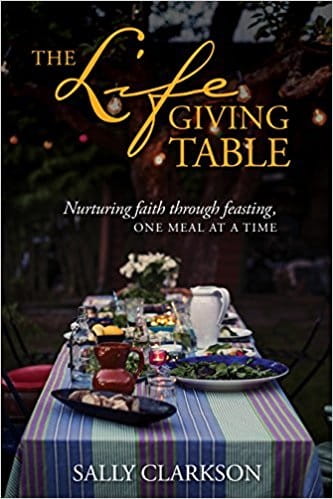An Anchor for Your Week: Starting Your Sundays Right

Every Sunday morning while our children were growing up we had a sit-down breakfast with a special treat like pancakes or French toast, a family devotional, and time for us to reflect together on what we had read. In fact, we still do it with whoever happens to be home at the moment.
I know that some might see traditions like our long-loved Sunday morning feasts as frivolous or simply impractical, but I strongly believe that we need traditions like these because they give us necessary anchors in our lives—our days and weeks and months and years.
Anchors are the moments when, no matter what, you stop, breathe, enjoy, rest, and check in with the Lord. They are moments of pause that lend significance to the everyday hustle and bustle. And just as we have holidays throughout the year to remind us of the story of our faith and to foster contemplation, we should have small anchors in our daily and weekly lives that remind us to stop and draw close to the Lord.
In the whirling and frantic urgency of life, it is easy to lose touch with our own hearts. On no day is this so evident to me as Sunday. It’s a day when our hearts should be centered, quiet, and focused on the Lord, but so often we find ourselves seated in church feeling depleted and disconnected. Since this is so often the case, it is vital to one’s spiritual health to approach church and Sundays with a heart of expectation and preparation, stillness and consideration.
But church is not always an easy thing. In my experience, it is rare to meet someone whose story with the church doesn’t involve at least a little bit of struggle, frustration, conflict, or pain. To me this seems only natural. We are fallen people in a fallen world, and the pursuit of God, love, and a righteous character in the context of other sinful, fallen people is bound to be fraught at times.
People—good people—find themselves blindsided by their inability to see eye to eye. Secretly cruel or wounded people sow seeds of gossip and dissension and end up breaking up a church. Unanswerable questions lead to doubts that are difficult to manage—or rigid suppression by those who cannot handle doubt. People who move to a new city or state may have trouble settling into community and find themselves deeply lonely, without a kindred spirit in sight.
These struggles are not new, of course. They’ve been around for centuries. But that doesn’t make them any easier to navigate.
Not surprisingly, sentiments toward church and Sundays are as diverse as the people who hold them. Our personal histories profoundly impact our experience and outlook. Some of us look forward to church every week as a place to enjoy community and joyous praise. Some dismiss church attendance as a legalistic practice designed to produce guilt. For some, church is a confusing place full of unanswered questions and suppressed doubts, while for others it is a place for growth and delight and depth. For still others, church represents the feeling of isolation, of never fitting in.
I have at various times and in various ways experienced all of those feelings toward church. Knowing in my heart that such difficulties were inevitable, I always desired to prepare my children for them. I wanted to make a safe space where they could work out such tensions in the safety of our home, at the comfort of our breakfast table.
Some parents are understandably afraid of these moments of tension arising in their children’s lives, especially where faith is concerned, and as a result they seek to avoid conversations that might raise questions. I understand this fear, and yet I think giving in to it can only result in damage.
It is almost inevitable that when children reach their teen years, they will push against some of the beliefs and values they have grown up with. They may become acutely aware of the seeming hypocrisy of believers, even in the family itself. This is actually a good thing. Spiritual muscle is built by testing faith in order to build personal convictions and make that faith their own. But growth often involves growing pains, and these may include uncomfortable feelings and attitudes about both God and church.
Better than avoiding such difficult moments in life is to prepare your heart for them. And I’ve found that setting aside a special time before church helps with that. It gives my family and me time to center ourselves and ask, How are we going to approach church, rest, and God this week? What is bubbling in our hearts today?
Jesus did not come to save us into isolation, but to save us into community. We are called to live out our discipleship in the context of other believers with whom we worship, eat, pray, and grieve: church. But in a fractured world where church is not easy, we should be thoughtful about how we approach it. I wanted my children to have the opportunity to prepare for this reality and to explore it. What better time could there be than right before we headed to church ourselves?
I have often been struck by Jesus’ patience with His disciples. For the most part, He did not reprimand His disciples for their questions, but patiently redirected them again and again to the Scriptures and to truth. He prepared them for what was to come, be it good or bad. I want my heart to be shaped by Jesus in such a way that I lead my children in the same way, guiding them through difficult questions and seasons, preparing them for the storms of life and celebrating the beauty of life. And as I attempt to do that, I ask God for the grace to guard my own heart for all the seasons that come.
In setting the table every Sunday for a feast, I hope to create in them a sense of belonging—not only to the Clarksons, but also to the family of God. In the midst of questions or frustrations, I want them to know there is always a place for them. Just as Sunday morning feasts are anchors in the week, I hope that our table can be an anchor in their hearts. That through pecan pancakes and hot tea they might know they will never face a struggle alone.
My children have grown into beautiful adults, and I often miss those days of familial unity and familiarity. Yet even now, when my children are home, I see the closeness those years wove. And when, on those cherished occasions, we join hands to pray around a table filled with pecan pancakes, I am deeply thankful for the ways our hearts have been knit together in pursuit of God and love of each other. And I can say with thorough enthusiasm that each flipped pancake was worth it.

Sally Clarkson is the beloved author of multiple bestselling books, including Own Your Life, The Lifegiving Home with her daughter Sarah, Desperate with Sarah Mae, and most recently, Different with her son Nathan. As a mother of four, she has inspired thousands of women through conferences, resources, and books with Whole Heart Ministries (www.wholeheart.org). She has also advocated relentlessly for the power of motherhood and the influence of home through her Mom Heart conferences (www.momheart.org), speaking to audiences on several continents.
Discipleship and mentoring women to understand how to love God in a more personal way and how to live a satisfying Christian life are threads through all of her messages. Sally encourages many through her blogs, podcasts, and websites. You can find her on her blog at www.sallyclarkson.com. Her popular podcast, At Home with Sally Clarkson and Friends, with over a million downloads, can be found on iTunes and Stitcher. She regularly teaches at conferences and on webcasts, and she participates in international discipleship ministry in venues all over the world.
Image courtesy: ©Thinkstock/vadimguzhva
Publication date: October 3, 2017
Originally published October 03, 2017.







